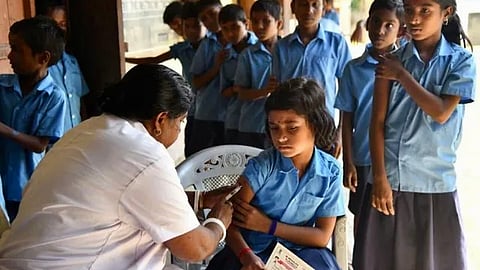As measles outbreak knocks Mumbai, health workers struggle to overcome distress
Mumbai is currently witnessing a measles outbreak. Between September and October, a total of 142 positive cases of measles have been reported, along with seven alleged associated deaths. 80% of the reported cases are from the M-East ward that covers Govandi. Brihanmumbai Municipal Corporation (BMC) has advised parents to immediately immunise their younger children with measles-rubella (MR) vaccines.
Measles outbreak in Mumbai
Reportedly, Mumbai is facing 12 measles outbreaks (cluster of cases), of which five have been reported in Govandi taking the tally to 1,037 suspected cases in city. As per BMC data, seven suspected deaths by measles have been reported, four at Kasturba hospital, two at Rajawadi hospital and one patient had died at home. Following the sudden surge in measles, BMC has increased the number of beds to over 100 for the patients – 86 in Kasturba Gandhi hospital, 10 at Shatabdi hospital in Govandi and seven in Rajawadi hospital.
Brihanmumbai Municipal Corporation (BMC) is also conducting door-to-door surveillance to identify suspected cases of the disease among children. Team of Anganwadi workers, community healthcare workers and NGO volunteers have been appointed to undertake surveillance and hold vaccination camps. Apart from this, an expert from WHO is here to spread awareness about vaccines in Govandi, Mumbai.
How important is it to take measles vaccines?
Measles or as it is called ‘khasra’, is a highly contagious viral disease which affects mostly children. It is one of the leading causes of death and disability among young children. BMC has identified over 20,000 children within the age bracket of nine months to five years, who haven’t taken the scheduled MR vaccines.
As per the National Health Mission, in India, first dose of measles vaccination is given under universal immunisation programme at 9-12 months of age. The second dose is administered at 16-24 months of age.
Children who are not vaccinated are at a high risk of contracting the disease, which in some cases can be fatal or cause significant morbidity.
To get all the latest content, download our mobile application. Available for both iOS & Android devices.

